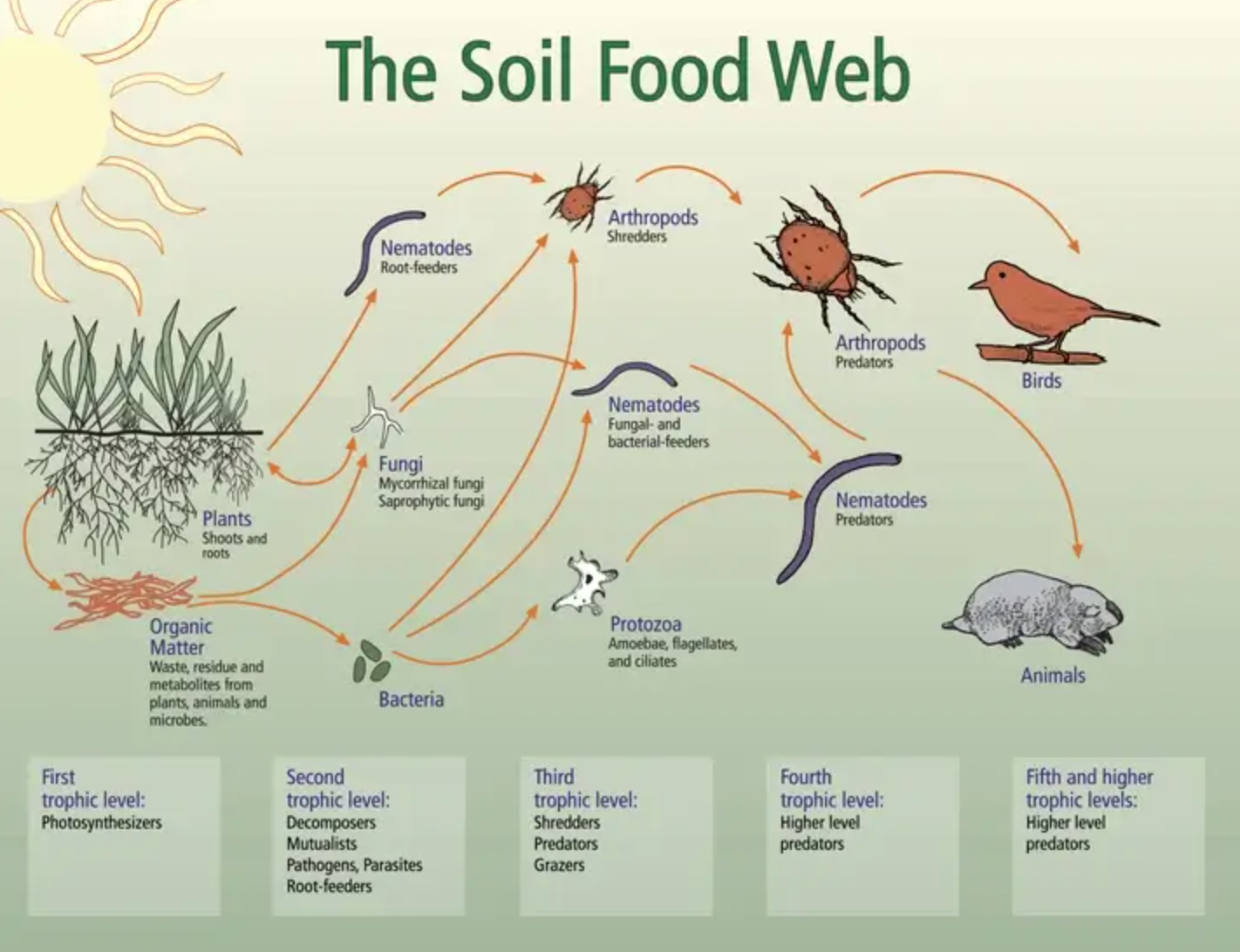Microbial Life in Soil
Soil is more than just a medium for plant roots to anchor; it is a living ecosystem teeming with microbial life that plays a crucial role in plant health and growth. Microorganisms such as bacteria, fungi, and protozoa contribute to soil fertility by breaking down organic matter, cycling nutrients, and forming symbiotic relationships with plants. For instance, mycorrhizal fungi form symbiotic relationships with tree roots in forests, extending their hyphae into the soil to access nutrients like phosphorus, which they share with the trees. This mutualistic relationship enhances tree growth and soil fertility. Similarly, the decomposition of leaf litter by fungi and bacteria in a forest floor demonstrates how microbes break down complex organic matter into simpler nutrients accessible to plants. These microbes release enzymes that decompose complex organic compounds into simpler molecules that plants can absorb. Protease, an enzyme produced by soil microbes, breaks down proteins into amino acids, which are essential for plant growth and development. Thus, maintaining a vibrant microbial community in the soil is fundamental for nurturing healthy, robust plants.
Organic gardening enhances soil microbial life by avoiding synthetic chemicals and relying on natural inputs that support microbial diversity and activity. Organic practices such as composting, mulching, and using organic fertilizers promote the growth of beneficial microbes, which in turn enhance enzyme activity in the soil. For example, in natural ecosystems like prairies, organic matter from plant residues and animal manure enriches the soil, fostering a diverse microbial community that aids in nutrient cycling. Enzymes such as protease play a vital role in converting organic matter into plant-available nutrients, ensuring that plants receive a steady supply of the building blocks they need for growth. Additionally, organic gardening fosters the production of amino acids, which are crucial for various physiological processes in plants, including photosynthesis, nutrient uptake, and stress resistance. The lush, healthy growth of plants in organic farm systems compared to conventional farms is a testament to the benefits of these practices.
Protozoa, another vital group of soil microorganisms, feed on bacteria and release nutrients in plant-available forms. They play a significant role in nutrient cycling and maintaining soil fertility. For example, in a natural meadow, protozoa feed on bacterial populations in the soil, helping to regulate their numbers and release nutrients like nitrogen in forms usable by plants. By preying on bacteria, protozoa help regulate bacterial populations and ensure a balanced soil ecosystem. This microbial interaction creates a dynamic environment where nutrients are continuously recycled, enhancing soil fertility and promoting plant health. Organic gardening practices support this intricate web of life by providing a habitat rich in organic matter and free from harmful chemicals that could disrupt microbial communities.
Living soil rich in bacteria is actually beneficial for plant health and should not be feared. Many people mistakenly associate bacteria with disease, but the majority of soil bacteria are harmless or even beneficial to plants. For instance, in natural ecosystems like wetlands, bacteria play a crucial role in breaking down organic matter and aiding in the biogeochemical cycling of nutrients, which supports plant growth. These beneficial bacteria assist in nutrient cycling, improve soil structure, and protect plants from harmful pathogens. By fostering a diverse and active bacterial community, living soil creates a robust and resilient environment where plants can thrive. Understanding the positive role of bacteria in soil can help dispel fears and encourage more gardeners to embrace organic methods.
In contrast, synthetic farming practices often rely on chemical fertilizers, pesticides, and herbicides that can have detrimental effects on soil microbial life. These chemicals can kill beneficial microbes or inhibit their activity, leading to a decline in soil health and fertility. In agricultural landscapes where synthetic chemicals are heavily used, such as conventional cornfields, the soil often becomes depleted of beneficial microbes, leading to reduced soil fertility and poor plant health. Without a healthy microbial community, the soil's ability to break down organic matter and cycle nutrients is compromised. Plants grown in such conditions may lack the long chains of organic compounds they need to express their full genetic potential, resulting in weaker plants that are more susceptible to diseases and pests.
In conclusion, the importance of microbial life in soil cannot be overstated. Organic gardening practices are essential for fostering a healthy soil ecosystem rich in enzymes and amino acids. By supporting the growth and activity of beneficial microbes such as bacteria, fungi, and protozoa, organic gardening ensures that plants receive the nutrients they need to thrive. Conversely, synthetic farming practices can disrupt soil microbial communities, leading to a decline in soil health and plant vitality. Therefore, embracing organic gardening is crucial for sustainable agriculture and the long-term health of our planet's ecosystems.
